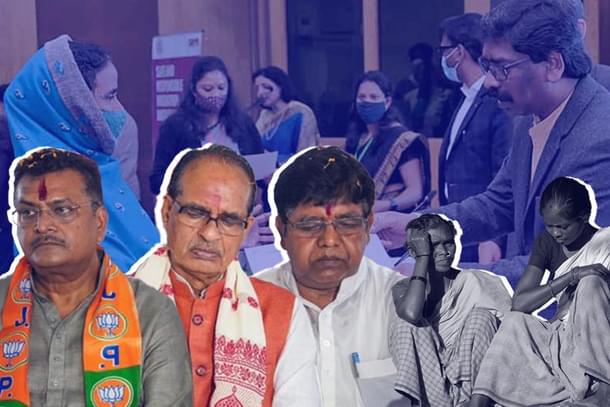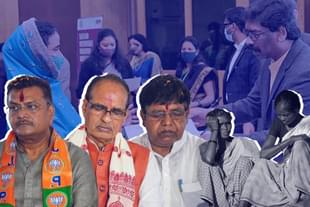Politics
Demographic Shift In Jharkhand: Can BJP Turn Concerns Into Electoral Gains?
Abhishek Kumar
Jul 18, 2024, 12:45 PM | Updated 12:45 PM IST
Save & read from anywhere!
Bookmark stories for easy access on any device or the Swarajya app.


On 16 July 2024, a delegation from the Jharkhand Unit of Bharatiya Janata Party (BJP) held discussions with Ravi Kumar, Chief Electoral Officer of Jharkhand.
The delegation, led by Rakesh Prasad, vice president of Jharkhand unit of BJP demanded an investigation into the sudden increase in the number of voters in many constituencies. The rise is as high as 123 per cent in one election cycle.
According to the BJP, its assessment was based on surveys done in 10 assembly constituencies.
Few days before this move, Amar Kumar Bauri, leader of opposition in Jharkhand legislative assembly had accused the Hemant Soren government of doing appeasement politics on the lines of nearby West Bengal. He said that there is a deliberate attempt to convert Santhal Parganas into another Murshidabad.
Bauri termed changing demography a threat to the existence of tribals and Hindus. Citing the example of Bhognadih, birth place of Sido-Kanhu, Bauri said that the number of tribal families have come down to six. He also informed that the problem has now spilled over to Kolhan division.
On 11 July, 2024, Babulal Marandi, Jharkhand BJP chief also expressed fear regarding changing demography. Maranadi estimates that if the trend is not reversed, Santhal Parganas won’t have a thriving tribal population in five decades.
The problem of illegal migrants is more prevalent in Santhal Parganas of the state. The Parganas consists of six districts namely — Sahibganj, Godda, Jamtara, Deoghar, Dumka, and Pakur. As reported earlier by Swarajya, the illegal migration began in the aftermath of the Bangladesh liberation war. More than 1.2 crore illegals came into India and started to look for settlements in and around West Bengal.
After saturating Malda, Murshidabad and Dinajpur in Bengal, these illegal immigrants — mostly Muslims crossed Bengal and started to take shelter in Santhal Parganas. Congress, Rashtriya Janata Dal (RJD) and current Jharkhand Multi Morcha (JMM), all governments encouraged it during the last five decades.
No wonder, more than 90 per cent of Muslims in Santhal Parganas are of foreign origin. Compared to 8 per cent share in population at the beginning of 1970s, they now comprise 27 per cent of total population. Sahibganj and Pakur bordering Malda district of Bengal are worst affected. Muslims’ share in both these districts is well above 38 per cent.
Muslims make up over 25 per cent of the population in Godda district, nearly 24 per cent in Deoghar district, over 22 per cent in Jamtara district, and more than 10 per cent in Dumka district.
With the increasing population of Muslims, cultural frictions have began to crank up. One key issue is the population itself. Neeraj Hembrom, a Santhal activist, says that governments’ population control measures are practised only on tribals.
On the other hand, Muslims produce as many children as they wish. The polygamous culture contributes to an explosion of population within a generation.
To put simply, tribals are asked to control their population while Muslims are incentivised to increase it.
This puts a massive burden on tribals for sharing their resources. In the name of sharing, they are losing their jal (water), jungle (forest) and zameen (land). According to a letter by a special branch of Jharkhand government, madrassa-educated Muslim youth also deploy the technique of love-jihad to grab the land.
They firstly marry a tribal daughter and then transfer land ownership to themselves by nefarious means, which includes forceful grab as well. In the last few years, tribals have also witnessed unsolicited incursions into their religious and cultural festivals. Multiple restrictions are being imposed on them.
Despite tribals losing everything, the Soren government is conspicuously silent about the influx. JMM’s alliance with Congress and RJD — both parties which have deliberated mistranslated minority protection as minority appeasement — is the main reason behind it. The Sorens also walk on tried and tested territory of appeasement politics.
One party, which has been vocal about it is BJP. However, the consistency in its stand has been marred by the inconsistency in timings and strategy around it.
For instance, the party does move the pendulum around elections with vociferous campaigning against the issue, but when BJP formed government under Raghubar Das, it was slow to implement reforms required to weed out the problem.
Das, who considers illegal migration as the third big challenge after terrorism and naxalism was not able to bring National Register Of Citizens (NRC) in Jharkhand.
Midway through his push for bringing NRC, Das lost power, leaving with the perception of being an anti-tribal government. BJP also lost ground among tribals, which resulted in tribals not believing the party's position about the impact of illegal migrants on their own livelihoods.
The lack of organised resistance among tribals with regards to outsiders has been taken advantage of by JMM-Congress-RJD coalition for their appeasement politics. From BJP, one counter narrative is securing more economic opportunities to tribals.
Suyash Jha, expert on Jharkhand and its politics, says that BJP’s narrative has a design fault. “For tribals, the meaning of development has historically meant displacement from their lands and cutting of jungles which many of them consider sacred,” said Jha
Jha recommends that BJP should pass on the message that they will ensure local livelihood opportunities in animal husbandry, cottage handicrafts industry and forest produce processing among others. The localisation of economic development is the only way to ensure goodwill among tribals.
Once the ground is made, the party can proceed with telling tribals that the alliance in power is after their jal, jungle and zameen.
The question is can BJP do it in such a short span of time. Shivraj Singh Chouhan — the man in charge of BJP's poll strategy in Jharkhand has to streamline both strategy and resources around it.
Abhishek is Staff Writer at Swarajya.





